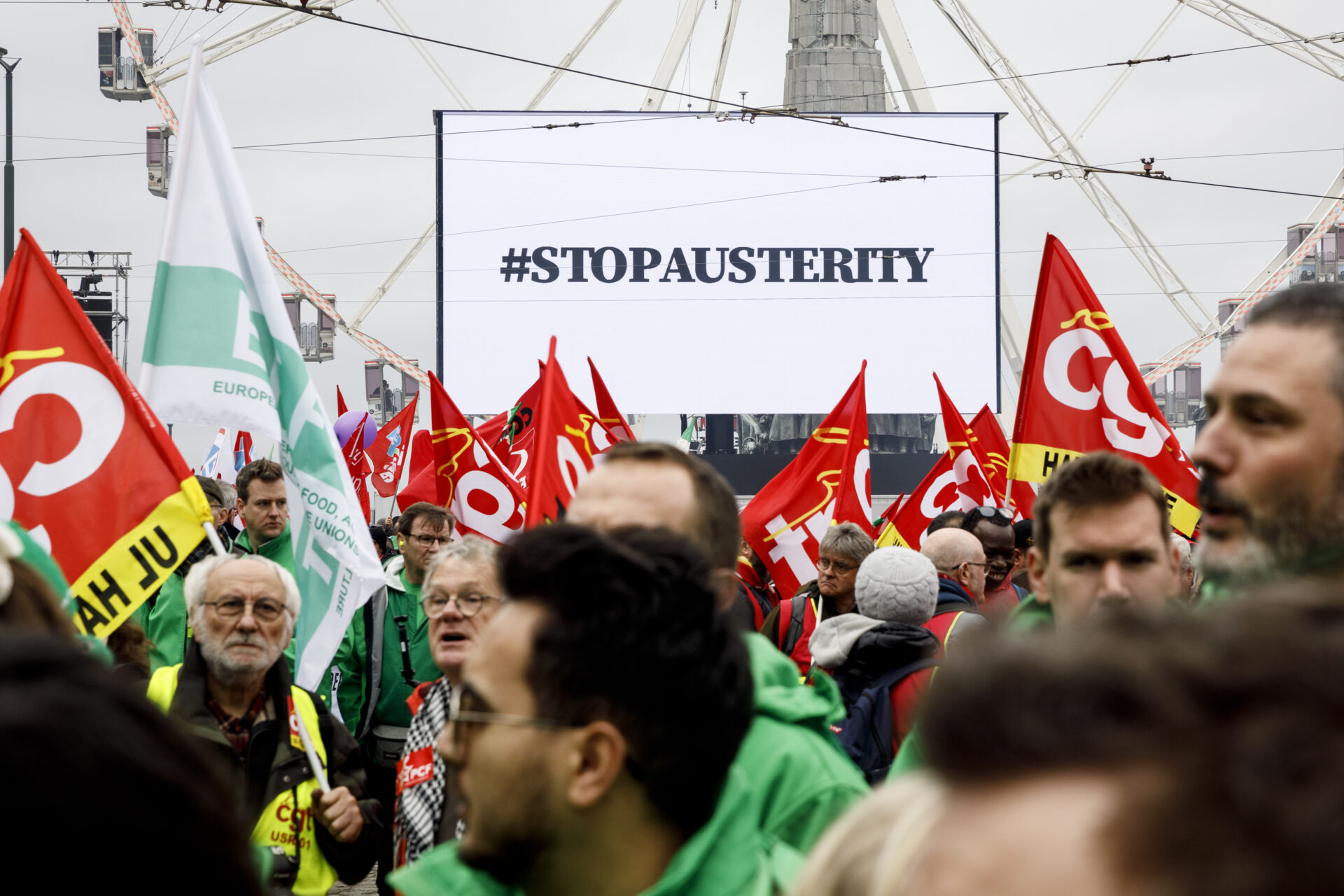Trade unions are taking to the streets on Tuesday in protest of a Europe-wide "return to austerity". They say EU fiscal reforms will push Belgium to slash social spending, which will "inevitably impact a lot of people". But do the reforms really equate to austerity?
Socialist union FGTB-ABVV will lead a demonstration at the Schuman roundabout from 12:00 on Tuesday. Around 2,000 people are expected to take part and trade unionists from France, Italy and elsewhere will be present.
In February, EU Member States agreed on fiscal reforms that aim to control budgetary deficits. The European Parliament will vote on the reforms this spring, ahead of which unionists are eager to voice their concerns.
The current proposal would require Member States to make significant cuts to social spending, which the FGTB says spells trouble for Belgium. The country would have to save €4 billion a year for seven years, or €7 billion a year for four years, in order to save a total of €28 billion by 2028.
"Almost €30 billion is 10% of the Belgian Government's budget," FGTB President Thierry Bodson told The Brussels Times. "That is an enormous amount. We can't accept it."
"This is how the (social) government is dismantled. You do not need to be an economist to know that our rights will come under heavy pressure."
What's at stake
Determined to reach an agreement before European elections in June, 16-hour negotiations between the European Parliament and Member States were held in February to produce the proposal currently on the table.
The reform aims to modernise the EU Stability and Growth Pact (SGP), which says a state’s budget deficit cannot exceed 3% of GDP and national debt cannot surpass 60% of GDP. However, the SGP has never been fully respected as it is viewed as too stringent and therefore impractical.

A protest against austerity in December 2023. Credit: Belga / Hatim Kaghat
The new text makes the rules more flexible and allows Member States to choose their own course of action for managing debt. However, the bill's opponents contest a clause introduced by "frugal" countries such as Germany. This seeks to impose a "minimum effort" on Member States to rein in their deficits.
As a result, Belgium would be under pressure to significantly cut spending to fall within the targets. At current rates, the national budget deficit is on course for 5% of annual GDP in 2025 – significantly more than the 3% limit defined by the SGP.
The FGTB argues that the resulting cuts to spending would signal a return to austerity: "We would be forced to take drastic measures with serious social consequences. But at present, Belgium is a relatively resilient economy compared to its neighbours. In our view, there is no justification for accelerating the pace of change."
Impact and alternatives
Trade unions are most concerned about the social cost of the reforms. "Since the Maastricht Treaty it has always been the same solutions: reductions to social benefits, pensions, healthcare, salaries and social security in general," Bodson stated.
Politically speaking, the FGTB fears that a return to austerity would be a "fast-track" for far-right parties to garner support during elections in June. It calls on the Federal Government to either vote against the reforms or abstain from the vote altogether during the next European Summit.
Following Belgium's elections in June, it urges the next government to introduce an alternative fiscal reform that is less socially damaging. On a European level, the union hopes to see much more budgetary flexibility.

Finance Minister Vincent Van Peteghem. Credit: Nicolas Maeterlinck/Belga
Belgium's position on the reforms remains unclear. In February, Finance Minister Vincent Van Peteghem (CD&V) said that the EU would not be allowed to control the country's fiscal policy but he conceded that reform of some sort was essential in order to avoid this scenario.
"We are still behind the wheel but we must avoid ending up in the penalty box with Europe imposing things on us," Van Peteghem said at the time. He also emphasised the importance of preserving social security and the welfare state.
A spokesperson for Van Peteghem's office told The Brussels Times that the FGTB claims are "unfounded" and rejected that the new rules constitute a return to austerity. The office insists that the new fiscal framework "takes into account the importance of investments" whereas the previous EU stipulations had "focussed only on bringing down national debt."

